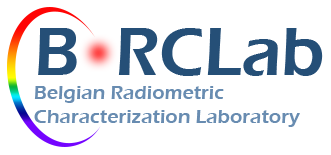The team
Dr. David Bolsée
Dr. David Bolsée is working at the Royal Belgian Institute for Space Aeronomy since 31 years. After a master in Physics and Geophysics, he started to work in the 90's on absolute radiometry applied to Solar Spectral Irradiance (SSI) measurements, especially for ground-based experiments in the frame of European projects. The objective was to initiate long-term monitoring of UV SSI in Europe. In 1999, after the selection of the SOLAR/SOLSPEC space experiment by ESA as a payload for the International Space Station (ISS), he worked on SSI measurements from space. His main contribution was to upgrade the instrument for long-term mission and to extend its performances for absolute radiometry. He contributed to the 9-year SOLAR/SOLSPEC mission on the ISS (2008-2017, PI since 2014). Moreover, he obtained a PhD thesis in 2012 on SOLAR/SOLSPEC (optical metrology, radiometry) at the Free University of Brussels. Since 2017, he is at the head of the D42 section of BIRA-IASB (Solar Irradiance and Radiometry). Between 2018 and 2021, he provided main efforts to upgrade the available facilities in the frame of the ESA MAJIS/JUICE project, and led the complete electro-optical characterization campaigns for the Flight and Spare models of the MAJIS VIS-NIR array detectors. Nowadays, his main activities are to contribute to the development of the Belgian Radiometric Chararcterization Laboratory (B.RCLab) at BIRA-IASB, whose objective is to become a reference laboratory for metrology applied to radiometry, and to contribute to new ground-based and space projects within the framework of solar irradiance measurements, Earth energy balance and planetary sciences.
Nuno José dos Santos Pereira
He started working in the Belgian Institute for Space Aeronomy in the Solar Irradiance and Radiometry group on Solar irradiance data analysis from the SOLSPEC/ISS instrument. He also developed NIR ground-based instrumentation that successfully complemented SOLSPEC/ISS comprehension of the exo-atmospheric Solar spectral irradiance.
Further he took interest in the characterization of matrixial detectors, for each he developed radiometric benches and performed data analysis of the Flight and Spare Models H2RG detectors of the MAJIS/JUICE instrument as well as the ALTIUS EM UV and VIS e2V detectors.
He is currently a PhD candidate at the KU Leuven, on the development of the VenSpec-H/Envision instrument. More specifically to analyze the impact of instrumental features on science, extend radiative transfer models to Venus-like exoplanets and tackle some of the EnVision related science questions.
Miriam E. Cisneros-González
M. Sc. Miriam E. Cisneros-González is a PhD candidate from the Catholique University of Louvain (UCL), in Belgium. She is working at the Royal Belgian Institute for Space Aeronomy since 2018 in the framework of her Ph.D. thesis: "Characterization of MAJIS/JUICE VIS-NIR detectors and impact of MAJIS over the scientific observations of the atmospheres and surfaces of Jupiter and the Galilean Moons". Her main contribution was in the design and development of the cryogenic and security system of the VIS-NIR characterization facility of the B.RCLab. She has an Electronics Engineer degree specializing in Electronics Systems from the Technological Institute of Durango, in Mexico. In 2016, she obtained her Master in Sciences degree with specialty in Astrophysics from the National Institute of Astrophysics, Optics and Electronics (INAOE), Mexico. During her Master's Thesis, she worked on the integration and characterization of the cryogenic system, as well as on the alignment of the CCD detector of MEGARA, a High-Resolution Multi-Spectrograph for Astronomy operating in the Great Canary Telescope (GTC), Spain, since 2017. She has collaborated in other astronomical projects, including the Islands Cosmological Probe for the Detection of Neutral Hydrogen (SCI-HI), the solar coronograph ASPIICS from PROBA3, an IR nanosatellite for Earth observations, and a CubeSat for IR solar observations. Currently, she is mainly focused on the development of the radiative transfer model of Jupiter's atmosphere.
Lionel Van Laeken
Lionel Van Laeken has been working since 2018 (first year as an intern) at the Belgian Institute for Space Aeronomy on the ESA JUICE space mission to Jupiter. He is passionate about space science, especially space flight and exploration. That's why he decided to study civil engineering at the University of Liege in 2012, to focus on the aerospace field and acquire high-level technical skills. In 2019, he obtained his master's degree in aerospace engineering. During his three-year career at BIRA-IASB, he participated in the development of a high-end laboratory to both reproduce Jupiter's environment and to correctly calibrate the MAJIS detector, a payload of the JUICE satellite. His team was responsible for the spectral characterization of the flight and spare models of the MAJIS spectrometer. He also made minor contributions to the UV network of the institute.
Dr. Etienne Brodu
Dr. Etienne Brodu joined the Royal Belgian Institute for Space Aeronomy in 2023 to reinforce the radiometry team. During his PhD he conducted the evaluation of the optical performance at high temperature of the materials candidate for the fabrication of the main thermal protection system and of the SWEAP and FIELDS instrumentation of the Parker Solar Probe NASA mission. He then worked as a scientist for 6 years in the field of electron microscopy, proposing and developing new methods to expand the capabilities of electron microscopes, with the objective of generating information traditionally out of reach with these instruments. With a significant background in experimental applied physics, his interests are interaction of radiation (electron and photons) with materials and systems, innovative method development and data analysis.

